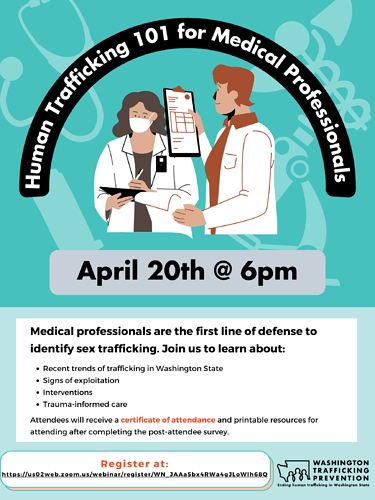Washington Trafficking Prevention is hosting a Human Trafficking for Medical Providers next week. The main points of contact for this training are Cammy Widman and Gabi Reynolds. I have included them on the cc line of this email for ease of connection.
Washington Trafficking Prevention(WTP is excited to announce a new program we are hosting for healthcare providers. WTP is a survivor-led nonprofit with a mission to prevent human trafficking in Washington State through education and empowerment. As a profession that provides services to populations who are at a higher risk of exploitation, healthcare providers are in the unique position to identify and help children and adults experiencing sex trafficking.
Why is provider education on trafficking so important?
Sex trafficking is a public health issue. Survivors experience both acute and chronic health issues while being trafficked, putting healthcare providers in a unique position to identify and assist children and adults experiencing exploitation. Studies have shown that over 80% of trafficking survivors have contact with medical providers while being trafficked, however, only 6% of providers report caring for a person experiencing sex trafficking. WTP would like to increase healthcare provider knowledge and awareness of human trafficking, empowering healthcare workers to identify and assist those experiencing exploitation.
Why is this program needed? When we hear sex trafficking, we often think of kidnapping, however, most exploitation starts much closer to home. Familial trafficking is one of the most common entry points into sex trafficking. Child exploitation has dramatically increased during the pandemic. King County alone reported a 162.5% increase in 2020. Child exploitation happens to the most vulnerable in our communities, who have unmet basic needs and have multiple intersections with oppression. The average age somebody is first exploited in Washington is only 14 years old. Healthcare providers need to be equipped with the knowledge and skills to identify and assist those experiencing exploitation.

